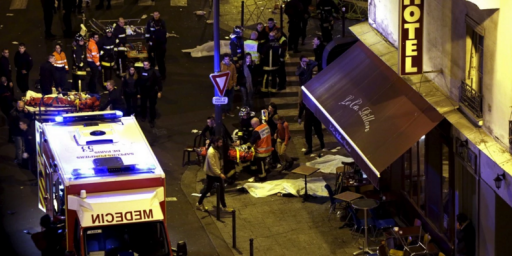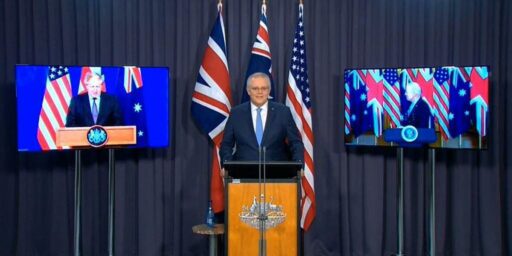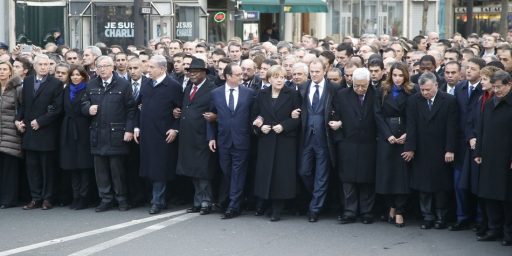France Rearrests Former Guantanimo Detainees
French Push Limits in Fight On Terrorism – Wide Prosecutorial Powers Draw Scant Public Dissent (WaPo, A01)
In many countries of Europe, former inmates of the U.S. military prison at Guantanamo Bay, Cuba, have been relishing their freedom. In Spain, Denmark and Britain, recently released detainees have railed in public about their treatment at Guantanamo, winning sympathy from local politicians and newspapers. In Sweden, the government has agreed to help one Guantanamo veteran sue his American captors for damages. Not so in France, where four prisoners from the U.S. naval base were arrested as soon as they arrived home in July, and haven’t been heard from since. Under French law, they could remain locked up for as long as three years while authorities decide whether to put them on trial — a legal limbo that their attorneys charge is not much different than what they faced at Guantanamo.
Armed with some of the strictest anti-terrorism laws and policies in Europe, the French government has aggressively targeted Islamic radicals and other people deemed a potential terrorist threat. While other Western countries debate the proper balance between security and individual rights, France has experienced scant public dissent over tactics that would be controversial, if not illegal, in the United States and some other countries. French authorities have expelled a dozen Islamic clerics for allegedly promoting hatred or religious extremism, including a Turkish-born imam who officials said denied that Muslims were involved in the Sept. 11, 2001, attacks on the United States. Since the start of the school year, the government has been enforcing a ban on wearing religious garb in school, a policy aimed largely at preventing Muslim girls from wearing veils.
French counterterrorism officials say their preemptive approach has paid off, enabling them to disrupt plots before they are carried out and to prevent radical cells from forming in the first place. They said tips from informants and close cooperation with other intelligence services led them to thwart planned attacks on the U.S. Embassy in Paris, French tourist sites on Reunion Island in the Indian Ocean and other targets. “There is a reality today: Under the cover of religion there are individuals in our country preaching extremism and calling for violence,” Interior Minister Dominique de Villepin said at a recent meeting of Islamic leaders in Paris. “It is essential to be opposed to it together and by all means.”
Interesting. The French approach to the war on terror has been rather odd, most notably its cooperation with Saddam’s regime and bitter struggle to derail our war effort there, but at least they appear serious in fighting the war on the domestic front. Freed from the type of electoral considerations our leaders face in such a diverse society, the Chirac government has been willing to go far further than we have in acknowledging that Islamofascism is the enemy. On occasions, as with the infamous head scarf ban, they have probably gone too far. I find myself hard pressed to criticize them for this particular action, however.
Cori Dauber has much more, including this observation:
It’s why I’ve argued before that the suggestion that the war in Iraq would somehow interfere with our ability to cooperate with other countries on intelligence at the ground level on the War on Terror is ridiculous. They may not have supported the war in Iraq, may not have believed it part of the GWOT, or necessary, (or may have been on Saddam’s payroll), but it just doesn’t matter. When it comes down to it, and it’s time to catch Islamists running loose, the cops in Europe, the counterterrorism officials, get it, and they’re going to play.
And, oddly, that’s especially true of the French. Their metro was bombed in the ’90s. Their elite troops stormed a hijacked jetliner on the ground, a jetliner the terrorists wanted refueled so that they could fly it into the Eiffel Tower and send burning debris all over downtown Paris. Say what you will of the French (and, ahem, I have) cop to cop, this just isn’t going to be a problem.
Likely true. Relations are going to be chilly at the top because French and American political culture is so different. Plus, Chirac is a jackass. That’s going to be true whether Bush or Kerry is president come January 20th. Cooperation at the professional level between military, intelligence, and law enforcement professionals will likely be just fine, however.





